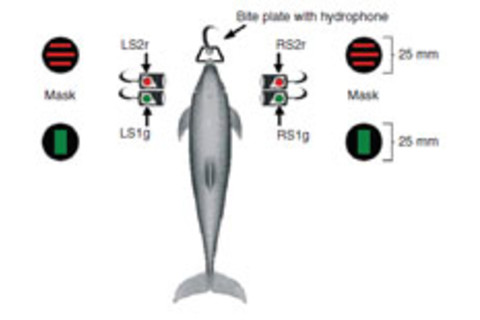
Most of us start to tire after about half a day without any sleep. Staying awake for five in a row would be extremely difficult and even if you could manage it, you'd be a physical and mental wreck by the end. But not all animals suffer from the same problem. A dolphin can stay awake and alert for at least 5 days straight, chaining together all-nighters without any noticeable health problems or loss of mental agility.
The two halves of a dolphin's brain can sleep in shifts, "shutting down" one at a time so that the animal is always half-awake. They can truly sleep with one eye open, an essential skill for an animal that has to be constantly watching for predators and timing its breaths.
Previously, Sam Ridgway from the US Navy Marine Mammal Program found that bottlenose dolphins could respond to a distinct noise for 5 straight days without any dip in accuracy. He trained a female called Say to recognise occasional 1.5-second beeps amidst a background of shorter 0.5-second ones. When she heard the longer tone, she pressed a lever for food. Say was slower to respond at night, but overall, her reaction times didn't slow over the five day run.
It was an impressive performance, but one that didn't require much in the way of thought. This time, Ridgway wanted to see if the dolphin's mental skills would take a hit after five days of continual vigilance. To do that, he trained Say, and another male called Nay, to make different noises for two different visuals - a whistle for a single, vertical, green bar of light, or a burst of sonar pulses for three, horizontal, red bars. Incidentally, dolphins are colour-blind; the colours were for the scientists' benefit.

Nay and Say sat for these tests over the course of five days, while they were doing the beep-test too. The visuals were only presented at night, when the dolphins are usually half-asleep. Even so, both animals responded to the long beeps and the two lights just as quickly and accurately on all of the five days. Having to cope with the more difficult visual task didn't hamper their performance on the simpler acoustic one.
After the experiment, neither dolphin showed any signs of making up for any lost sleep (snoozing dolphins typically swim slowly in circles or float at the surface, occasionally beating their tails to raise their blowholes).
Blood samples taken before and after the trials didn't reveal any signs of sleep deprivation either. The dolphins still had the same normal levels of white and red blood cells, minerals like calcium and iron, or hormones like dopamine, cortisol (which reflects stress levels), and norepinephrine. After five days of attention, they were still healthy, fit and alert.

Ridgway's results also confirm that dolphins can transfer things that they learn from one side of their brain to another. Dolphin eyes sit on the sides of their head and while both can move independently of each other, neither can see what the other one does very well. Ridgway trained the animals' eyes individually, while they were half-asleep. He expected that they would only respond to lights seen by the eye that was connected to the conscious half during the training sessions. But wasn't the case - clearly, what's learned on one half of the brain filters through to the other half.
These abilities are truly extraordinary. Almost universally, other animals take a hit to their mental abilities after periods of sleep deprivation far shorter than those that Nay or Say endured. And afterwards, they need to pay back their "sleep debt", snoozing for longer to make up for their insomniac nights. The dolphins had no such need. The same probably didn't apply to Ridgway and his team!
Reference Ridgway, S., Keogh, M., Carder, D., Finneran, J., Kamolnick, T., Todd, M., & Goldblatt, A. (2009). Dolphins maintain cognitive performance during 72 to 120 hours of continuous auditory vigilance Journal of Experimental Biology, 212 (10), 1519-1527 DOI: 10.1242/jeb.027896
More on dolphins:













